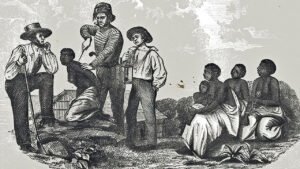
Religion has always played a powerful role in shaping societies. Unfortunately, it has also been used to defend injustice. One of the darkest examples in American history is how Christian slaveholders used the Bible to justify slavery. By twisting scripture, they built a false moral foundation for one of humanity’s greatest crimes.
Biblical Justifications for Slavery
During the 18th and 19th centuries, pro-slavery Christians repeatedly quoted certain Bible verses to defend their position. They often cited Ephesians 6:5, which reads:
“Slaves, obey your earthly masters with respect and fear, and with sincerity of heart, just as you would obey Christ.”
Another verse used was Colossians 3:22, which reinforced similar language. These passages, taken out of context, were interpreted to mean that slavery was sanctioned by God.
Even more troubling, many white preachers referenced Genesis 9:25–27, known as the “Curse of Ham.” They claimed Africans were descendants of Ham and thus destined to be servants. This distorted reading provided false moral and religious justification for racial enslavement.
In reality, these interpretations ignored the broader Biblical message of love, mercy, and equality. They reduced a complex, ancient text into a tool of control and exploitation.
Religion as a Tool of Control
Christianity was not only a justification for slavery — it became a means to control the enslaved. Many enslaved Africans were converted to Christianity, but their exposure to scripture was heavily censored. Slaveholders promoted a version of the Gospel that emphasized obedience and submission while erasing verses about freedom and justice.
For example, slave Bibles were printed with major portions of the Old and New Testaments removed — especially any stories about liberation, like the Exodus or Galatians 3:28, which says:
“There is neither slave nor free, for you are all one in Christ Jesus.”
These omissions weren’t accidental. They were part of a deliberate effort to prevent enslaved people from finding spiritual or social empowerment through faith.
By controlling what scriptures were taught, slaveholders weaponized religion to maintain power and suppress rebellion.
Abolitionist Christianity and the Fight for Truth
Not all Christians accepted this corrupted theology. In fact, many abolitionist leaders used the same Bible to argue for freedom and equality. Figures like Frederick Douglass, Harriet Beecher Stowe, and William Lloyd Garrison saw slavery as a direct violation of Christian morality.
Douglass, who escaped from slavery, famously said there was a difference between “the Christianity of this land” and “the Christianity of Christ.” He condemned the hypocrisy of those who prayed on Sunday and whipped slaves on Monday.
Abolitionist preachers pointed to scriptures that celebrated liberation and condemned oppression — from Isaiah’s call for justice to Christ’s teachings about love and mercy. Their voices helped awaken the moral conscience of the nation.
The Lasting Impact on American Christianity
The use of the Bible to justify slavery left deep scars on American Christianity. Churches in the South and North split over the issue, and those divisions have echoed for generations.
Even today, scholars and theologians continue to examine how these distorted interpretations contributed to systemic racism and inequality within religious institutions. Understanding this painful history allows believers to confront and dismantle the lingering effects of theological racism.
What We Can Learn Today
The story of how Christian slaveholders used the Bible to justify slavery is more than a history lesson — it’s a warning. It shows how sacred texts can be misused when people seek to justify their own power and prejudice.
True faith, rooted in love and compassion, challenges oppression rather than supports it. When read in full context, the Bible calls for justice, mercy, and equality — values that stand in direct opposition to slavery and racism.
Conclusion
The Bible was never meant to be a weapon of oppression. Yet, for centuries, Christian slaveholders turned it into one. By understanding this dark chapter in history, modern readers can ensure that scripture is interpreted through the lens of truth and love.
Faith should unite, not divide. It should liberate, not enslave. That’s the enduring message that outlives even the darkest distortions of the past.
